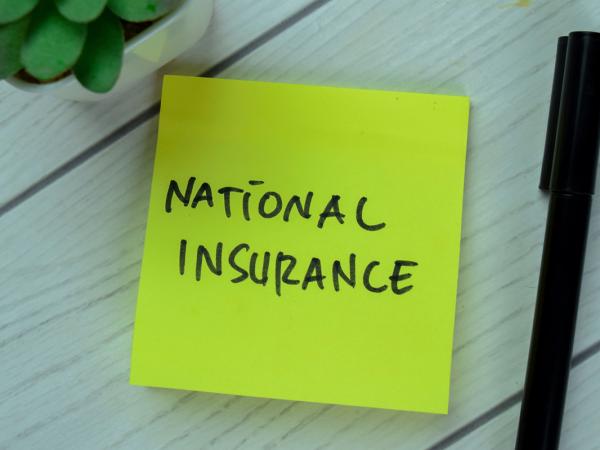International self-employment and NIC
If you are self-employed and you are carrying out work in another country from where you normally work, you need to consider whether you might be liable to social security in that country. Make sure you understand both the social security and tax implications of working overseas if you are normally self-employed in the UK, or working in the UK if you are normally self-employed overseas.

Content on this page:
Basics
Each country around the world has its own social security rules. The UK’s domestic social security (National Insurance contributions, or NIC) rules for self-employed individuals are set out in our guidance.
It is a basic principle for social security that you ‘pay where you work’. This applies to self-employed individuals as well as employees. However, there are important exceptions to this rule set out in international rules and agreements for people who are moving to a different country on a short-term basis. This is because paying small amounts of social security in different countries could affect your entitlement to social security benefits and be administratively complicated.
This means that if you move overseas to work, you may need to continue paying social security in your home country (and not need to pay social security in the overseas country).
Where an exception applies, you can apply for a certificate or document from the relevant authority to show this.
For self-employed individuals, there are two basic scenarios where you may not need to ‘pay where you work’:
- If you are usually self-employed in the UK, you might carry out some of your self-employed work temporarily outside the UK.
- Similarly, if you are usually self-employed outside the UK, you might carry out some of your work temporarily in the UK.
International social security is a very complex area and we only give a high level overview of the situation and process for getting a certificate or document on this page. We cannot cover every situation and you may need to seek professional advice.
Note that even where the rules say that you should pay in a particular country, you may still not actually have to pay any social security due to that specific country’s domestic rules.
For example, if you are normally self-employed in the UK and your overseas working means that you become non-resident for tax purposes in the UK, then you may not need to pay self-employed NIC even if the relevant international rules or agreement says you should continue to pay UK social security. This is because profits from a trade carried out outside the UK by a non-resident individual would not be taxable in the UK, and therefore will not count for self-employed NIC purposes.
In this case, you may be able to pay Class 2 NIC voluntarily to protect entitlement to certain state benefits. See our page NIC for the self-employed.
Temporarily working outside the UK
EEA or Switzerland
First, you need to determine if the ‘old’ co-ordinated EEA rules on social security apply to you. This could be because you were working in a cross-border situation on 31 December 2020 and you continue to work in that situation. For further information on the old rules, see our guidance for posted workers.
Under these rules, if you normally work as a self-employed person in the UK and go to another EEA member state (or Switzerland) to pursue a ‘similar activity’ in that country, then you generally remain ‘insured’ in the UK provided it is for a period not expected to exceed 24 months. In this case, you would not need to pay social security in the country in which you are working.
If you think you will be working in the other country for more than 24 months, then under the ‘old’ rules you could, by exception, apply to remain insured in the UK for a longer period (up to five years, usually).
For example, if you are self-employed and you started working from France on 1 March 2020 initially for two years, but you expect to still be there until 1 March 2024, you could apply to continue paying Class 2 NIC until that date, rather than start paying French social security from 1 March 2022.
The ‘old’ rules will not apply if you start working overseas for the first time after 1 January 2021 and you had no EEA connection prior to that date. In this case, the position will depend on which of the following sets of rules apply:
- In the case of Norway, Iceland and Switzerland, the social security arrangement between the UK and that country.
- In the case of Liechtenstein, the same rules as for ‘rest of world’ countries.
- In all other cases (that is, EU countries), the ‘new’ protocol on social security co-ordination.
For (1) and (2), see the headings below. Under the ‘new’ protocol, the rules are similar to the ‘old’ rules with one key difference: there is no ability to extend the 24-month period.
For example, if you are self-employed and you started working in Germany from 1 March 2021 initially for two years, but you now expect to still be there beyond 1 March 2023, you will need to pay German social security from that date.
If you remain insured in the UK under the 24-month rule, you should complete form CA3837. HMRC will then issue you with a certificate which you can use as evidence for exemption from social security in the country you are working. It is possible to apply retrospectively – this may be useful to protect against an enquiry by the overseas authorities.
Note that if you expect the period of work to last for more than 24 months from the outset, then you will usually need to pay social security in the overseas country from the outset too. This is true under both ‘old’ and ‘new’ rules – though remember that under the ‘old’ rules it is possible to apply for an extension.
If you normally work as a self-employed person in two or more countries, then the 24-month rule is not relevant. Under both the ‘old’ and ‘new’ EEA rules, you will need to pay social security in the country where you are resident if you perform a substantial part (at least 25%) of your activities in that country. If you do not perform a substantial part of your activities in your country of residence, then you will need to pay social security in the country where the ‘centre of interest of your activities’ is situated. You should complete form CA8421.
Note that if you are employed and self-employed in two or more EEA countries (including the UK) then the country where you need to pay social security on both sources of income is determined under the tests for employees.
If your situation is more complicated, you may find the Practical Guide on the Applicable Legislation in the EU, EEA and in Switzerland useful. You can find information for self-employed individuals in Part I, Section 8, and Part II, Section 9. You should note that this guide was written in 2014 for the ‘old’ co-ordinated EEA rules. However, where similar tests and principles apply under the ‘new’ protocol for social security co-ordination, we understand the information is similarly applicable.
You can also find up-to-date guidance on GOV.UK.
Social security agreement countries
The countries with which the UK has agreements for social security (not including Iceland, Norway and Switzerland) are listed on GOV.UK.
Unlike for tax, there is no ‘model’ agreement between two countries for social security purposes. You will need to check the wording of the relevant agreement. The rules on where you should be ‘insured’ (pay social security) are usually covered in Article 4.
For example, in the UK-US Social Security Agreement, it states at 4.3:
“A person who is covered under the laws on coverage of either Party with respect to self-employment shall be subject only to the laws on coverage of the Party in whose territory he ordinarily resides.”
This means that if you ‘ordinarily reside’ in the UK (and you are usually self-employed in the UK), and you temporarily carry out some self-employed work in the US, then you will continue to pay social security (NIC) in the UK on that work carried out in the US.
Unlike EEA rules, there is no time limit for the above provision. However, after several years working in the US, it may be difficult to argue that you continue to ‘ordinarily reside’ in the UK. To reiterate: each agreement will have its own rules and time limits – you need to check them carefully (in practice, you may need professional assistance to help you understand them).
To continue to pay UK NIC under a reciprocal agreement, you should apply for a ‘certificate of coverage’ or ‘certificate of continuing liability’ on form CA9107. For Norway, Iceland or Switzerland, you should complete form CA3837. The purpose of this certificate is to demonstrate to the overseas authorities that you are not required to pay social security in the country where you are working.
‘Rest of world’ countries
Rest of the world countries include Australia, South Africa and India. In this situation, you need to check the rules in the country you are temporarily working in. You may trigger a social security liability in the overseas country by working there for as little as one day, but most countries will have rules which aim to avoid this situation.
Remember you would also likely need to pay Class 2 NIC if your UK-taxable profits exceed the following thresholds for the relevant tax year:
- For tax years up to and including 2021/22, the small profits threshold (£6,515 for 2021/22);
- For tax years 2022/23 and 2023/24, the lower profits limit (£11,908 for 2022/23 and £12,570 for 2023/24).
If you meet the residence conditions described below for a given week, then you will be treated as having made Class 2 NIC in that week without actually needing to pay them in the following situations:
- For 2022/23 and 2023/24, if your UK-taxable profits for the year are between the small profits threshold (£6,725 in 2022/23 and 2023/24) and the lower profits limit.
- For 2024/25 onwards, if your UK-taxable profits for the year exceed the small profits threshold (£6,725 for 2024/25).
From 2024/25 onwards, Class 2 NIC is no longer required to be paid on a mandatory basis.
As your liability to Class 2 NIC (or, from 6 April 2024, your eligibility to pay voluntarily) is considered independently from your liability to social security in the overseas country, it is possible to pay social security in two countries at the same time with a ‘rest of world’ country.
Class 2 NIC residence requirements
Note that there are certain conditions regarding your residence status for National Insurance purposes which must also be met before you can be required (prior to 5 April 2024) to pay Class 2 NIC. At least one of the following must apply:
- You are ‘ordinarily resident’ in Great Britain or Northern Ireland.
- You were resident in Great Britain for at least 26 out of the immediately preceding 52 weeks.
If you are working outside the UK only for a short period, then you are likely to remain ordinarily resident in the UK. Even if you stop being ordinarily resident in the UK, in most cases you would continue to meet these residence conditions for 26 weeks after you left.
Temporarily working in the UK
EEA or Switzerland
The same rules apply as for UK self-employed individuals temporarily working in the EEA or Switzerland. See above.
For example, if you are normally self-employed in an EU country and you come to the UK for the first time after 1 January 2021 to carry out similar self-employed activities, then you should remain insured in your home country provided you do not expect the duration of the UK activities to exceed 24 months.
If you continue to be insured in your home country, you should apply for a certificate from your home country social security authority to demonstrate that you do not need to pay UK NIC on your self-employed activities in the UK.
Social security agreement countries
As above, you will need to check the wording of the relevant social security agreement between the UK and your home country.
If you continue to be insured in your home country under the agreement, you should apply for a certificate from your home country social security authority to demonstrate that you do not need to pay UK NIC on your self-employed activities in the UK.
‘Rest of world’ countries
If you carry out self-employed activities temporarily in the UK from a ‘rest of world’ country, then you cannot be required (prior to 5 April 2024) to pay Class 2 NIC for a given week unless at least one of the following applies:
- You are ‘ordinarily resident’ in Great Britain or Northern Ireland.
- You were resident in Great Britain for at least 26 out of the immediately preceding 52 weeks.
In practice, this means that if you have not moved here indefinitely (or otherwise become ‘ordinarily resident’ from day one) then prior to 5 April 2024 you will only need to pay Class 2 NIC from your 27th week of carrying out self-employed activities in the UK and if your taxable profits for that year exceed the relevant threshold. The relevant threshold is:
- for tax years up to and including 2021/22, the small profits threshold (£6,515 for 2021/22);
- for 2022/23 and 2023/24, the lower profits limit (£11,908 for 2022/23 and £12,570 for 2023/24).
If you meet the residence conditions described above for a given week, then you will be treated as having made Class 2 NIC in that week without actually needing to pay them in the following situations:
- For 2022/23 and 2023/24, if your UK-taxable profits for the year are between the small profits threshold (£6,725 in 2022/23 ad 2023/24) and the lower profits limit.
- For 2024/25 onwards, if your UK-taxable profits for the year exceed the small profits threshold (£6,725 for 2024/25).
From 2024/25 onwards, Class 2 NIC is no longer required to be paid on a mandatory basis.
Paying self-employed NIC
Self-employed NIC is usually paid via self assessment. For more information, see our separate guidance for self-employed individuals.
Note that, for tax years up to and including 2023/24, if you begin or stop being liable to Class 2 NIC during the tax year and you use HMRC’s online portal or third-party software to complete your tax return, you should check whether you need to make an adjustment to the total amount calculated to reflect the amount actually owed.
You will also need to ensure that your NIC record with HMRC correctly reflects the weeks for which you are liable. If you do not do this, HMRC may automatically override your own self assessment tax calculation. If in doubt, you should contact HMRC.



